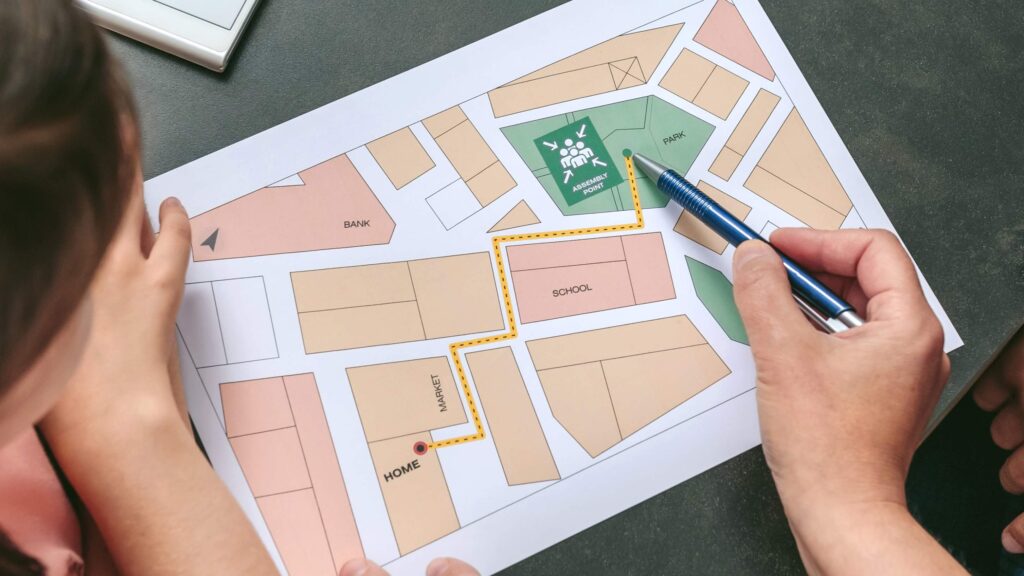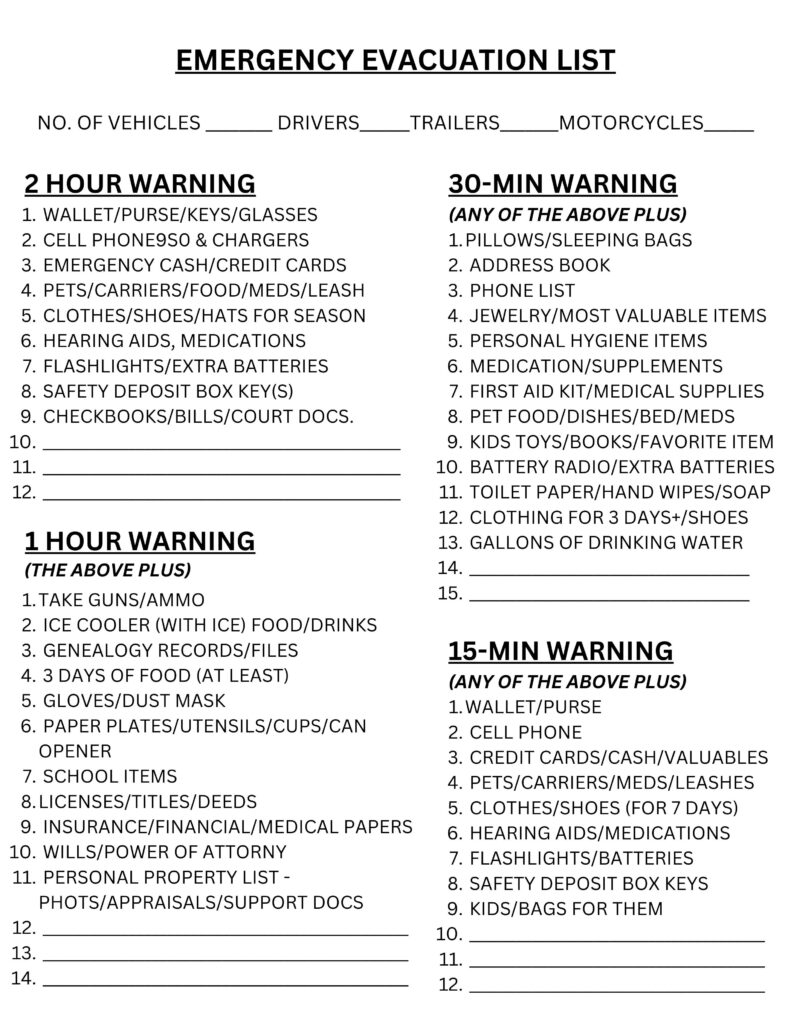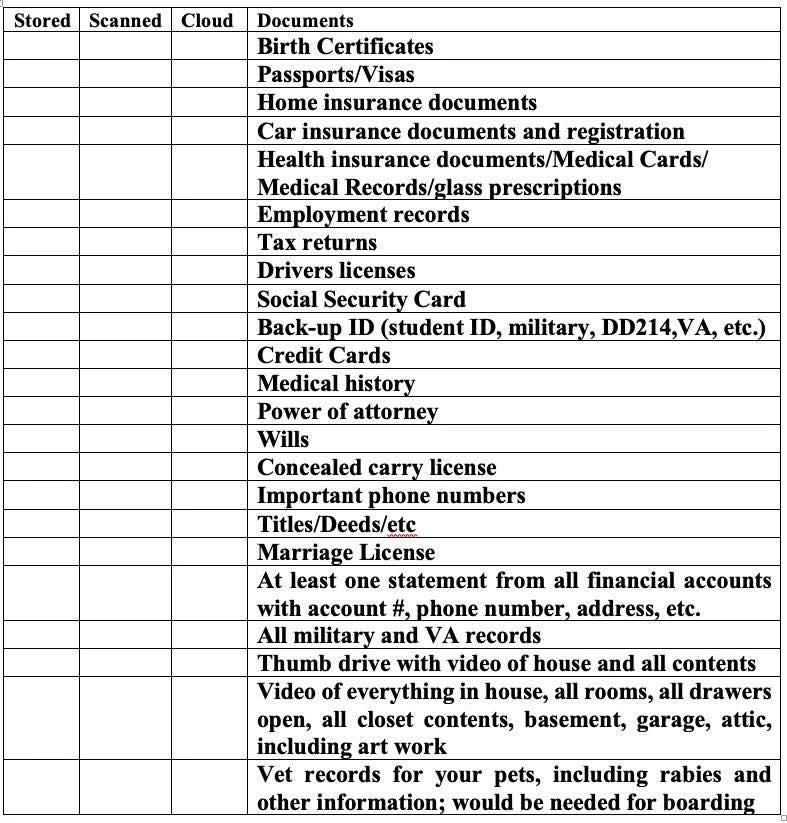Extended Emergency Kit for Remote Areas
Living in the Columbia River Gorge, where it takes significant time to reach main roads and towns, your emergency kit should be tailored for prolonged isolation or delayed evacuation assistance. Here’s an expanded version of the emergency kit list that considers this unique situation.

Water and Hydration
- Increased water supply: At least a week’s supply (one gallon per person per day).
- Water purification tablets or a portable water filter (in case your stored water runs out).
- Collapsible water containers: Extra storage for collected water from natural sources.

Food and Nutrition
- A week’s supply of non-perishable food, such as:
- Freeze-dried meals.
- Energy bars, protein bars, and nuts.
- Canned goods (vegetables, beans, tuna).
- Manual can opener.
- Cooking gear:
- Small camping stove or portable propane stove.
- Fuel for the stove (enough for several days).
- Mess kit (lightweight pots, pans, and utensils).

Communication and Navigation
Two-way radios: Useful for communicating with others in your vicinity if phone service is out.
Satellite phone: If budget allows, a satellite phone can ensure communication when cell service is unavailable.
Extra phone charging solutions: Solar chargers or multiple portable power banks.

Shelter and Warmth
Warm clothing: Consider colder nights, so pack extra jackets, thermal socks, and beanies.
Tent or emergency shelter (in case you need to leave your home or shelter outdoors).
Heavy-duty sleeping bags and thermal blankets.

Medical and First Aid
- Expanded first aid kit: Include extra supplies like bandages, antiseptics, splints, and any over-the-counter medications (pain relievers, anti-diarrheals, antihistamines).
- Freeze-dried meals.
- Energy bars, protein bars, and nuts.
- Canned goods (vegetables, beans, tuna).
- Prescription medications: Ensure you have at least a two-week supply.
- Personal medical devices: If you rely on medical devices (e.g., CPAP, oxygen), have a portable, battery-powered version or additional power sources.

Vehicle and Evacuation Prep
Vehicle emergency kit:
Jumper cables, tire repair kit, and spare tire.
Tow rope.
Extra fuel: Keep gas cans on hand, safely stored.
Snow chains or traction mats (for winter months).
Portable air compressor for tires.
Car phone charger or power inverter.
Cash: In case credit card systems are down.

Long-Term Power Solutions
Extra batteries for radios, flashlights, and other battery-powered devices.
Portable generator: For power outages, a generator can help run essential appliances and recharge devices.
Solar-powered battery bank: For renewable charging of electronics.

Personal Protection
- Fire extinguisher (small, portable type for your car and home).
- Fireproof bag for important documents and valuables.
- Protective clothing: Including face masks (N95 for smoke), gloves, and sturdy shoes.

Emergency and Survival Tools
Hatchet or survival knife: For cutting wood or clearing debris.
Paracord and tarp: For building makeshift shelters or securing items.
Multi-tool for general repairs.
Local maps with evacuation routes highlighted.
Signal flares or emergency beacons (for attracting rescue teams if stranded).
Additional Considerations for Remote Evacuation:
- Preparedness for Isolation: In remote areas, roads may be blocked by fallen trees or heavy traffic during evacuations. Be prepared for extended stays and possible isolation by keeping additional supplies.
- Fuel and Car Maintenance: Regularly ensure your car has a full tank of gas, especially during fire season, and carry extra gas if possible.
- Alternative Transportation: If your vehicle becomes unusable, a bicycle or other forms of transport may be helpful for reaching assistance.
Keeping a well-stocked emergency kit and being ready to shelter in place for several days is critical.

RIGHT CLICK ON THE IMAGE(S) BELOW, SAVE, PRINT FOR YOUR OWN HOME

